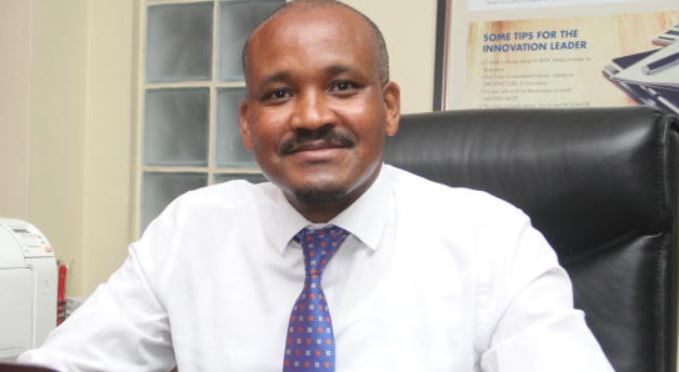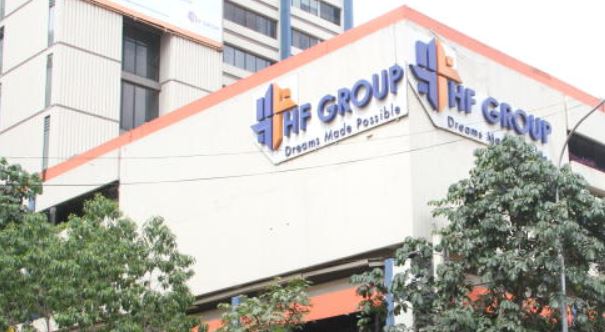
A sliced birthday cake is placed on a broad table in a boardroom on the second floor of Rehani House that houses Housing Finance’s (HF) headquarters.
It is Chief Executive Robert Kibaara’s birthday, and it is only befitting that he makes a wish on his big day.
“When I will be having my birthday in the next two to three years, I want this company to be a successful, full-service and digitally inclined bank,” Kibaara told Financial Standard last week.
It has been a long journey to the top for the man who now runs a firm with an asset base of Sh56.4 billion, having started off as a teller at a Barclays Bank (now Absa) branch in Narok some 25 years ago.
Two years since his appointment, he has been charting a new path for Kenya’s premier mortgage lender founded in 1965.
He wants HF to be more multifaceted as it moves away from being solely a property development company.
But it is a big task considering that he inherited a loss-making firm at a crossroads.
In the year ending December last year, HF cut its net losses by 81.6 per cent attributed to reduced operating costs. This was from a loss of Sh598.2 million the previous year.
Traditionally, HF has been a mortgage lender with a property development arm.
Kibaara now says this is about to change, with the company looking to diversify into retail banking.
He said at the start of last year, the mortgage and property development units started running into headwinds as a property slump took hold.
Most of the projects they’d financed were also doing badly, and this necessitated a change of strategy.
“We said we are going to exit property development and by this, we mean not getting directly involved in any new projects... we decided because the bank was solely dependent on a single sector, we needed to diversify into a full-service bank,” explained Kibaara.
This diversification meant that the company had to build new engines of growth, which informed the move into retail banking.
Before taking the helm at HF, Kibaara was the director of retail banking at NIC Bank (now NCBA) and has over two decades experience both locally and internationally, having also worked with the Standard Chartered Bank and Barclays Bank in executive positions.

He is confident this exposure has prepared him well for the task ahead. Kibaara said the focus now is strengthening segments such as Small and Medium Enterprise (SME), personal, diaspora and institutional banking. HF Group offices in Nairobi (PHOTO: File)
The shift in strategy also means the firm has had to move from long- to short-term lending.
“We decided that since mortgage was our bread and butter, we were not going to exit but change a bit how we do it,” he said.
“We are not pulling out of mortgages, but we are diversifying our business to make this company sustainable.”
Kibaara reckons that for a long time, companies in property development enjoyed high margins of up to 40 per cent, but the party was over as they face up to the new reality.
Good and bad bank
HF’s high exposure to the property sector slump had left them vulnerable amid high defaults and non-performing loans (NPLs).
“No sector keeps a boom forever. There will be a time when it’s difficult to sustain those returns,” he said.
Reviewing his two years in charge, Kibaara describes HF as “a mix of both a good and bad bank”. While some units are doing well, the mortgage and property arm is struggling.
He noted that a decision has been made to go slow on long-term projects that account for the lion’s share of the bank’s NPLs, which he said have now reduced by over Sh1 billion from Sh13.3 billion in 2018 to Sh12.3 billion in 2019.
The turnaround strategy involves the management of NPLs from 21 per cent last year to 17 per cent this year. According to Kibaara, this is the “bad” side of the bank.
Last year, HF shut down its investment unit, HF development and Investment Ltd (HFDI), in a move aimed at cutting losses and strengthening liquidity.
Most of HFDI’s assets and liabilities were transferred to the parent company.
As for the “good” side of the bank, Kibaara said, retail customer deposits have grown by over Sh3.5 billion and are still growing.
“These engines of growth are contributing significantly to the group’s bottom line,” he said.
HF’s net loan book closed at Sh38.8 billion last year compared to Sh43.4 in 2018. This was a drop of over 10 per cent.
The CEO said as a mortgage financier, they will focus more on affordable housing, which remains profitable. According to Kibaara, the company’s participation in real estate projects in the future will strictly be through partnerships with other developers.
HF will also partner with the Kenya Mortgage Refinance Company (KMRC) to offer home mortgages with a single-digit interest rate.
As part of his turnaround plan, he has brought in new people to run the bank’s various units, including in ICT to “re-energise” the bank.
“I found HF has had very good capabilities around mortgage built over 50 years and didn’t want to destroy that. So I got people experienced in that area. Where we added firepower is in the segments that we didn’t have internal capabilities,” he noted.
This has seen the launch of more digital products and the revamping of the lender’s mobile app.
Kibaara tapped Rose Muturi from mobile digital lender Tala to be the chief digital officer. She has 13 years’ experience, cutting across banking, credit scoring, product development and pricing, digital financial services and technology. Ms Muturi oversees HF Whizz, which is the mortgage financier’s digital banking platform.
The firm also has a digital marketplace portal where individuals can identify a house and apply for a mortgage.
Kibaara said the firm has brought workers from the back to the front office.
“If you think of a large animal with small teeth but a large tail, it can’t bite much,” he said.
“Now we’ve got this animal with a bigger mouth and a smaller body, and most fierce animals are like this.”
In the last two years, customers have grown by over 30,000, with NPLs reducing by close to Sh3 billion.
Kibaara has also overseen the successful redemption of HF’s Sh3 billion corporate bond issued in October 2012.
The bond had a tenor of seven years with a coupon of 13 per cent.
He noted that it helped restore confidence with drought having since hit the corporate bond market following the collapse of such offerings by a number of companies.
Cost rationalisation, recapturing mortgage leadership and building a direct sales driven deposit mobilisation unit is also a major part of the HF turnaround strategy.
“But most importantly today is that this bank is not dependent on a single sector,” said Kibaara.
He said when he came in, projects were the most problematic area as they accounted for Sh12 billion of lending, with 70 per cent being non-performing.
To cushion the lender from the effects of Covid-19 that have hit financial institutions, the bank has had to increase loan provisions.
This is for both NPLs and performing loans owing to new accounting standards.
“So we’ve had customers lose jobs, businesses closed for an extended time, pay cuts, and some businesses may never come back. Because of that, we inherit their challenges because we lend to them,” said Kibaara.
He further noted that as a result of Covid-19, the number of transactions in banking halls has reduced significantly, eating into their revenues.
Waivers on transactions of Sh1,000 and below have also seen the lenders also lose a key revenue stream.
“That’s a direct source of revenue foregone, running into millions of shillings,” said Kibaara.
He said the provisions will help in cases of defaults and if there are none, they will be written back into profits.
For over a year now, property auctions have taken centre stage owing to the high rates of defaults.
Kibaara said in the face of this, the bank has adopted alternative dispute resolution methods.
“We work with customers to help them get out of a problem. We avoid an adversarial kind of approach,” he said.
But this approach does not always work, forcing the bank to resort to auctioning some properties.
“There are some cases we must auction because we have a fiduciary responsibility for customers’ deposits and our shareholders as well,” said Kibaara.
At the start of last year, HF had about 52 projects, but the prevailing market conditions have forced it to exit some.
These include Komarock Heights, Clay City and Precious Gardens.
He said the coronavirus pandemic had disrupted a “nice trajectory” for HF. “All of a sudden the rules totally changed. We are now rethinking how to get the business moving back again,” said Kibaara.
He, however, noted that the acceleration of technology has been the silver lining during the pandemic, which has even seen 25,000 more customers turn to the lender’s digital channels.Households, added the CEO, have also learnt the importance of saving for a rainy day.
As a business leader, he’s also learnt of the importance of having multiple plans.
Kibaara, who looks up to Equity Bank’s James Mwangi, said he’s not afraid of exploring alternatives.
“I love challenges and I thrive in uncertainty. I am not worried.”
His roots in a cold village on the slopes of the Aberdares, he said, have informed his work ethic as have his parents, who he said achieved a lot without any formal education.




No comments :
Post a Comment